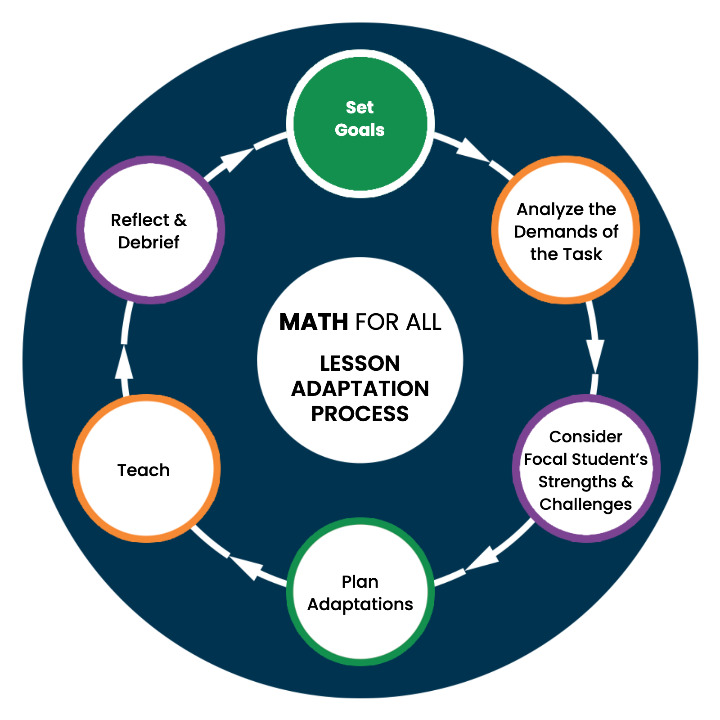Lesson Adaptation Process
Participants in Math for All professional learning develop skills and strategies to adapt lessons in ways that increase access to rigorous mathematics for all learners, including students with disabilities. Conducted collaboratively with colleagues, the Lesson Adaptation Cycle guides educators through a process where they consider a lesson’s goals and determine the cognitive and social demands of a mathematical activity in light of learners’ strengths and challenges. They then adapt the lesson in ways that increase students access to the mathematical content without changing the mathematical goal. After teaching and observing the focal child work through the adapted lesson, they reflect on the implementation with colleagues, gaining new insights about their students and approaches to reducing barriers to mathematical learning.

Set Goals
Understanding the mathematical goals of a lesson before designing adaptations to make it more accessible to learners with different strengths and challenges is essential. Doing so allows Math for All teachers to develop adaptations that increase student access to mathematical learning without changing the mathematical goals in an effort to maintain the same academic rigor for all students in the class.
Analyze the Demands
Math for All introduces teachers to a neurodevelopmental framework of learning. This framework identifies eight systems that come into play when learning: higher order thinking, language, spatial ordering, sequential ordering, memory, attention, psychosocial thinking, and motor coordination.
Math for All teachers identify the cognitive and social demands of a given activity by enacting a selected math lesson hands-on, in the exact same way their students would, parsing out the neurodevelopmental functions that are called on in order to engage with the task.
Analyzing the demands of the task, helps teachers to better understand the various neurodevelopmental functions it engages and why students may succeed or struggle in mathematics.
Consider Strengths & Challenges
Starting in the first Math for All workshop, teachers select a focal student. This is a child in their class whose learning they’d like to better understand or whose learning strengths and challenges they want to know more about. The teacher keeps the same learner, the focal student, in mind over the workshop series as they plan adaptations to upcoming mathematics lessons.
Plan Adaptations
Taking into account the goals, the demands of the task, and a focal child’s strengths and challenges, teachers collaborate to adapt an upcoming math lesson; that is they make small changes to the lesson that they feel will increase the accessibility of the lesson to their focal student while keeping the mathematical goals of the lesson intact. An adaptation made for a specific child in mind positively impacts other students as well.
Teach
Math for All teachers teach the adapted math lesson to their class, taking particular note as to how their focal student engaged with the task. Teachers learn how to conduct low-inference observations, documenting what they see and hear in a way that is, ideally, free of interpretation and bias.
Reflect & Debrief
Math for All teachers reflect on their observations, bringing them into lesson planning conversations with colleagues. Teachers’ understanding of their focal student’s neurodevelopmental profile deepens, and their repertoire of lesson adaptations for diverse learners increases, each time they go through the Lesson Planning Cycle.
Problem-solving Stories
Hear from Math for All teachers about how they used the Lesson Adaptation Process to increase student access to the mathematics of specific math problems from their classrooms. Their stories bring the Lesson Adaptation Process to life and offer concrete examples of how Math for All professional development directly impacts their practice and students.
The Wheel Shop
The Wheel Shop
A fifth grade teacher presents a different rich task to students each month, as required by his district. The same task is shared with all teachers at this grade level. He uses the Lesson Adaptation Process to guide his thinking as he adapts the rich task to better support a specific student.
STORY 2: Description sentence LAP
sequo dit eaquae v luptu
Faccus, aspeditatet volo te cus quis dolorepti ommodignia nossequia eaquibus debit aut u llaboriatem et a volesciis ut erspit apiendi tias per spietus, officat aut ve nis eaquam, conse nos. as.volorundi aspelloreet a volesc dfre pietus, officat aut venis eaquam, conse nos.
STORY 3: Description sentence LAP
sequo dit eaquae v luptu
Faccus, aspeditatet volo te cus quis dolorepti ommodignia nossequia eaquibus debit aut u llaboriatem et a volesciis ut erspit apiendi tias per spietus, officat aut ve nis eaquam, conse nos. as.volorundi aspelloreet a volesc dfre pietus, officat aut venis eaquam, conse nos.




